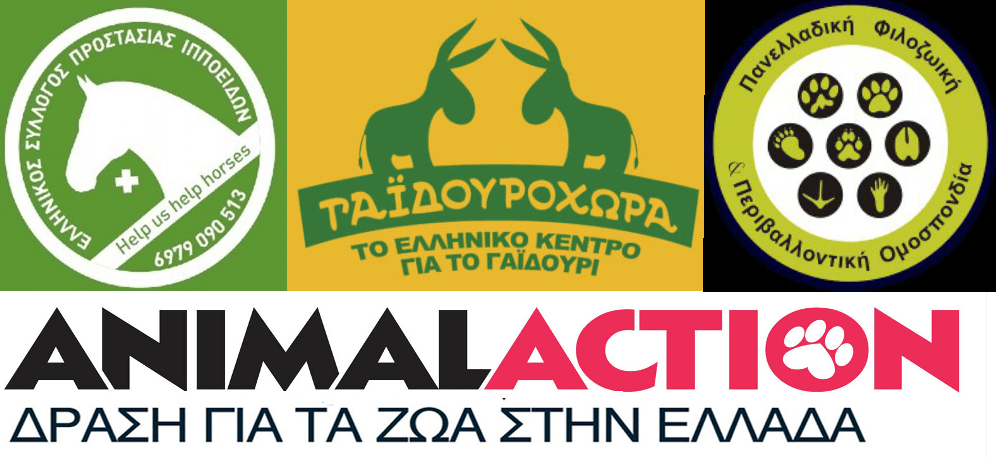
Anda Dimopoulou (PFPO, responsible for equines), Tatiana Papamoschou (Gaidourohora), Serafina Avramidou (Animal Action), Christina Alexandrou (E.S.P.I.) and officials of the Ministry attended the meeting, which took place on 15 July 2020. Adopt legislation on equines protection and welfare was the object of the meeting.
The following officials of the Ministry were present:
-Chris Zafeiridis (Advisor/Associate of Minister)
-Aikaterini Antipati (Advisor/Associate of Under Secretary)
-Spiros Doudounakis (Director, Animal Health Directorate, Directorate General of Veterinary Services / Animal Health Directorate)
-Aikaterini Marinou (Head of Department of Laboratory and Farm Animal Health)
-E. Iliopoulou (Head of Department of Animal Genetic Resources: Cattle, Pigs and Equines)
On behalf of bodies’ representatives it was mentioned that equines are often subjected to active and passive abuse. Specific reference was made to mistreatment of working animals and race horses.
Apart from lack of education and information of owners, main causes include the following:
-Equine identification and registration in electronic database is not mandated by law, lack of implementation of European Law 2015/262 on equines passport
-Absence of a specific legal framework on equines
-Lack of comprehensive code of good practice which includes equines categories (race horses, working equines, pet equines and equines used in tourism, etc.), owners’ responsibilities and animal welfare
-Shortage of qualified inspectors
It was made clear that the existing animal law n. 4039/2012 concerns other animal species and there is a little reference to equines. It is urgent that a specific legal framework is established even though there are two circulars on those animals welfare.
Also, it was mentioned that there are difficulties in coping with abuse and abandonment reports. As equines are not registered, it is quite difficult to be identified, while there is shortage of qualified inspectors to respond directly to aforementioned incidents.
During the meeting, it was emphasized that Animal Action Hellas and other organizations provide free veterinary treatment throughout the country and inform owners on their responsibilities. It should be noted that owners respond positively, a fact which depicts that change of mentality is possible.
Ministry’s officials have shown a great interest in understanding all problems concerning equines and they reacted positively to proposals on behalf of bodies.
Also, it is great to know that:
-Ministerial Decree on mandatory equine identification and registration in electronic database will be issued in a few days’ time.
-Two sources in the European Commission website about horses and donkeys will likely be used by several bodies as animal welfare guideline:
https://ec.europa.eu/food/animals/welfare/eu-platform-animal-welfare/platform_conclusions_en
Thus, discussion topics in the next meeting are listed below:
-Establishment of separate legal framework on equines
-Improvement of control system to ensure effective implementation of rules and laws
We are optimist about any positive change on behalf of Greek state. Without further delay, we will take all necessary steps to ensure equine protection and welfare.
PROPOSALS OF ORGANISATIONS
The Greek animal legislation does not concern equines (horses, donkeys, mules). Apart from general articles of animal protection law, there are only some circulars. Also, there is a lack of comprehensive code of good practice which includes equines categories (race horses, working equines, pet equines and equines used in tourism, etc.), owners’ responsibilities and animal welfare. Equine registration database is not available while animals do not have the appropriate passport, as required under European legislation in force.
In light of the above, which have already been mentioned, the undersigned organizations point out once again the lack of legislation on equines. They call on adoption of legislation related to their welfare and protection.
In particular:
- Conformity of Greek legislation with EU legislation.
On 8 August 2018 additional implementing measures of Commission Implementing Regulation (EU), No 2015/262 were subject to public consultation. This regulation laying down rules pursuant to Council Directives 90/427/EEC and 2009/156 EC, as regards the methods for equine identification (equine passport regulation).
It is unknown why the procedure had stopped. Two years later, nothing has changed. What is the reason for this delay? What the Greek state will do for the implementation of Greek legislation and conformity to the EU legislation?
- Establishment of separate legal framework on equines including:
- Code of good practice for equine needs and welfare.
- Animal categories (race horses, working animals, animals used in tourism, pet equines, etc.) with regard to their specific characteristics and needs.
- Precise definition of active and passive abuse (foot binding, unhealthy hooves, exposure to weather conditions etc.).
The framework must be established by equine experts in co-operation with organizations which have knowledge about the situation regarding equines in Greece.
3.Designation of competent Authority for Audit Body (consisting of employers with knowledge on equines) and the implementation of legislation.
Finally, it should be mentioned that establishment of equine legislation will result in reliable registration of population and limitation of illegal trade protecting animals and responsible owners.
